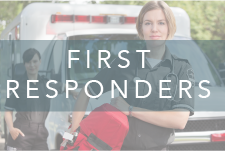Building Resilience in First Responders
- Nov 1, 2021
- 5 min read
Updated: Nov 10, 2025

You've come to the right place for information on building resilience for first responders. We understand the unique challenges faced by those in high-stress professions and have the insights you need to navigate these critical issues. The key to long-term success and well-being in this field lies in proactive strategies.
What is resilience for first responders?
Resilience is the ability to return to a stable mental state after a stressful or traumatic event. It's about recovering a sense of agency and maintaining healthy decision-making skills by distancing oneself from stress and trauma.
Want to dive deeper into how first responders can build and maintain their resilience? Keep reading to discover actionable strategies for protecting your mental health, both on and off duty.
First responders are placed in stressful situations on a regular basis, and being mentally, physically, and emotionally prepared for the stresses of such a dangerous line of work is essential. However, first responders are still human beings, and their own health is just as important as that of the communities they serve.
Building resilience is essential for maintaining mental health for first responders. Incorporating resilience-building strategies in their daily lives can improve their ability to confront the trials of each morning and continue to serve friends, family, and community in the line of duty.
Building Resilience First Responders: What Is Resilience?
The topic of resilience is incredibly important for maintaining a healthy mindset. However, it is even more important for those facing crises and stressful situations every day. First responders' emotional health is constantly being pushed, and understanding what resilience is can help to develop pertinent strategies to strengthen oneself in the face of stress.
Resilience is the ability to return one's mental state to a stable homeostasis while avoiding acting on survival instincts or traumatic impulses – a way of returning to a “pre-crisis” mental state. The ability to distance oneself from stresses and trauma is vital for regaining a semblance of agency amidst stressful situations. Doing so can help to hold a healthy mindset while informing one's decision-making skills when returning to work after a high-stress event.
While each individual can benefit from a strong emotional resilience to cope with daily stresses, first responders may find that maintaining a healthy and resilient mind is essential for their continued service. Returning to the field following a traumatic encounter is incredibly taxing. Recovering one's mental health can be difficult as these stresses compound with repeated exposures, further compromising one's ability to tend to their duties effectively.
Incorporating resilience-building strategies and strengthening one's emotional fortitude is paramount for returning to duty with a safe and healthy mind, keeping one's decision-making skills sharp and unclouded. Likewise, building a strong basis of emotional resilience can help keep one's home life separate from the stresses of work. Ensuring workplace stresses stay confined to the professional sphere can improve the quality time that one gets to spend with friends and families off-the-clock, as well.
Incorporating Resilience-Building Strategies in Daily Life
Building emotional resilience to the difficulties first responders face is difficult and takes time. There are no strategies that one can employ that will make one immune to the stresses of work. Keeping up with resilience-building techniques is essential in maintaining a healthy balance in one's life. Incorporating these strategies is beneficial not just for improving one's emotional resilience, but also for coping when stresses become more difficult to cope with.
Continuing Education
Education is a powerful tool in any situation. For first responders who are regularly subject to stressful situations in the service of others, being educated about the physical, mental, and emotional risks of one's job can provide a sense of control in the situation.
Studying potential sources and symptoms of trauma can empower each individual to be more vigilant of these signs within themselves, opening them up to reaching out for help to cope with daily stresses. These may derive from one's family, friends, or profession.
Continuing to educate oneself on the effects of these situations can also provide a safety net in one's resilience. While the symptoms of stress can be difficult to deal with, knowing the effects can provide a space of understanding, creating a concrete space for one to begin their recovery.
Nutrition and Sleep
Keeping the mind filled with sufficient energy and rest is essential for maintaining a healthy resilience. Stresses have been shown to keep one awake at night. Unhealthy meals and lack of sleep can be actively detrimental to a brain's typical functions.
Ensuring to be rested and healthy can provide the mind with the necessary resources to continue prioritizing one's better judgment. Scheduling healthy meals and a concrete bedtime can allow first responders to prioritize their mental health to cope with the stresses of the workplace.
Resilience Is Personal
Stress and trauma will affect each individual differently, and avoiding comparing oneself to others is essential in determining how one is processing their experiences. Avoiding comparisons in regards to traumatic experiences is essential, however, it can also be practiced regardless of the presence of recent trauma.
Dismissing comparisons in professional ventures, personal accomplishments, or any other aspects is incredibly beneficial. This can help each person practice focusing on themselves rather than concerning themselves with the opinions of others.
Avoiding social media and keeping a journal of one's feelings, concerns, and accomplishments can instill the necessary mindset to be aware of one's own needs and be ready to act on them while remaining indifferent to outside influence or opinion.
FAQs on First Responder Resilience:
• Why is resilience so important for first responders?
Resilience is essential for first responders because it helps them maintain a healthy mindset, make clear decisions, and continue to serve their communities effectively after a high-stress event.
• What are some daily strategies for building resilience?
Daily strategies for building resilience include continuing education about trauma, prioritizing proper nutrition and sleep, and avoiding comparing oneself to others.
• How does continuing education help with resilience?
Continuing education can provide a sense of control by helping first responders understand the physical, mental, and emotional risks of their job. It also helps them recognize symptoms of stress and trauma in themselves.
• How do nutrition and sleep affect a first responder's resilience?
Proper nutrition and adequate sleep are crucial because they give the mind the necessary resources to prioritize good judgment. Lack of sleep and unhealthy meals can be detrimental to brain function.
• Why is it important for first responders to avoid comparing themselves to others?
Avoiding comparisons is essential because stress and trauma affect everyone differently. Focusing on one's own experiences and needs, rather than the opinions or accomplishments of others, is key to developing personal resilience.
First responders sacrifice their well-being to serve us every day, and at Chateau Health and Wellness, we're dedicated to supporting them in return. We recognize the profound impact that job-related stress and trauma have on our heroes, and we're here to help them build the resilience needed to continue their vital work. Our team is ready to guide you or a loved one toward a healthier, more balanced life. We invite you to take the first step in prioritizing your mental health by reaching out to us. Call us today at (435) 222-5225 to begin your journey toward lasting wellness.

About The Author
Ben Pearson, LCSW - Clinical Director
With 19 years of experience, Ben Pearson specializes in adolescent and family therapy, de-escalation, and high-risk interventions. As a former Clinical Director of an intensive outpatient program, he played a key role in clinical interventions and group therapy. With 15+ years in wilderness treatment and over a decade as a clinician, Ben has helped countless individuals and families navigate mental health and recovery challenges.







